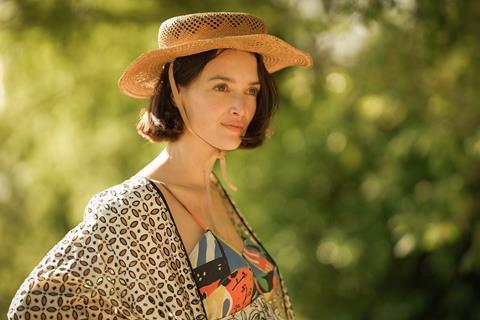Charlotte Le Bon embodies French artist Niki de Saint-Phalle in Celine Sallette’s vivid biopic

Dir: Celine Sallette. France, 2024. 98mins
Actor-turned-director Celine Sallette creates a vibrant portrait of French-American artist Niki de Saint-Phalle in her impressive debut feature Niki. A raw, emotional performance from Charlotte Le Bon dominates a film that gradually reveals the way in which art becomes a way of conquering trauma and finding a voice for this ground-breaking mid-century sculptor who later revealed horrific abuse as a child. Arthouse distributors should recognise the potential in a vivid biopic in the tradition of Fur (2006), Seraphine (2008) and Paula (2016).
Le Bon rises to the challenge of a demanding, multi-faceted role
Best known for her roles in House Of Tolerance (2011) and TV’s The Returned (2012-2015), Sallette turned to directing with the 2020 short L’Arche Des Canopies. Her first feature is an arresting dramatisation of de Saint-Phalle’s early life in which the ripe colour palette and febrile mood combine to evoke a troubled mind.
Niki begins as de Saint-Phalle (Le Bon) sits for a photo shoot in her modelling days, a beautiful young woman in the 1950s with the look of a movie icon. The tiara, sparkling earrings and bright red lipstick evoke the fairytale princess look of Grace Kelly or Audrey Hepburn. All poise and professionalism, de Saint-Phalle is uncomplaining as she endures the demands of the shoot. We then see her rush home to tend to her baby daughter, before heading to a rehearsal for a stage production of Cocteau’s Infernal Machine and meeting her husband, writer Harry Matthews (John Robinson) for a cocktail at a chic Paris nightclub.
Sallette economically establishes the sense of a successful woman who has it all, and manages to keep every plate spinning. The brassy, blowsy soundtrack from Para One adds to the verve of this narrative. Yet, the rest of the film is devoted to exposing this perception of de Saint-Phalle as an illusion.
Asked why have left America to settled in Paris in 1952, de Saint-Phalle, who was born in France but grew up in the US and her American husband cite McCarthyism, racism, the nuclear age and Harry’s mother as their reasons. It also becomes apparent that de Saint-Phalle wants to maintain as much distance as possible from her family in general, and father in particular. Heavy-handed flashbacks hint at the horrors in her past, and her schoolgirl response of smearing red paint over the genitalia of statues in an art gallery.
The focus of the film becomes de Saint-Phalle’s mental health struggles and the way her art became her salvation. Many obstacles stand in her way, including a patronising psychiatrist who would rather protect the guilty than admit what had happened to her, and a jealous, bitchy rival who dismisses her collages, paintings and creations as merely a ”housewife’s hobby”.
Sallette brings a real energy to de Saint-Phalle’s story. Split screen sequences help maintain the pace of the storytelling and the film looks a treat. Costume designers Matthieu Camblor and Marion Moules makes a vital contribution as de Saint-Phalle sports a selection of eye-catching headwear and a wardrobe of plaids, checks and what looks like the height of 1950s fashion.
Niki is, however, a little too on-the-nose in places, with a sketchiness that allows little time to flesh out some backstories or reflect more on events. Yet the performances remain compelling and persuasive throughout. Although de Saint-Phalle first husband Harry feels underdeveloped as a character, Robinson captures his blandly supportive nature. Damien Bonnard makes Swiss sculptor Jean Tinguely, who would become de Saint-Phalle’s second husband, a warm, sympathetic figure, and Judith Chemla makes the most of a modest role as Tinguely’s first wife Eva.
Towering above them all is Le Bon, rising to the challenge of a demanding, multi-faceted role. She captures a sense of the constant emotional toll on a woman trapped by her past and seeking the strength to break free. In her art, de Saint-Phalle took broken fragments, shattered mirrors and abandoned debris and transformed them into something new and meaningful. There is a similar sense of rebirth in Le Bon’s committed and moving performance.
Production companies: CineFrance Studios, Wild Bunch
International sales: Pulsar Content. sales@pulsarcontent.com
Producers: David Gauquie, Julien Deris, Florence Gastaud
Screenplay: Celine Sallette, Samuel Doux
Cinematography: Victor Seguin
Production design: Rosen Le Gloahec
Editing: Clemence Viard
Music: Para One
Main cast: Charlotte Le Bon, John Robinson, Damien Bonnard, Judith Chemla















![[L-R]: Amanda Villavieja, Laia Casanovas, Yasmina Praderas](https://d1nslcd7m2225b.cloudfront.net/Pictures/274x183/6/4/1/1471641_pxl_20251224_103354743_618426_crop.jpg)









No comments yet